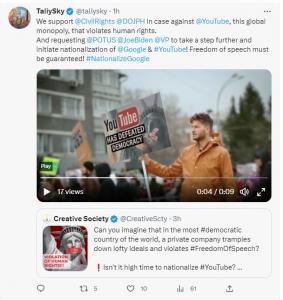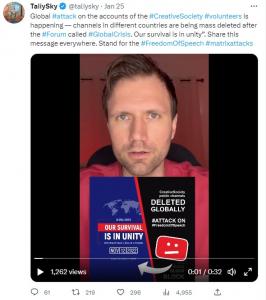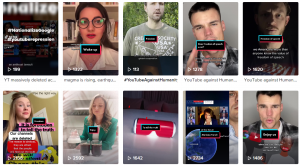Campaign to Nationalize Google Is Growing In Public Support After Many Accounts Were Terminated By YouTube Recently

YouTube Terminates Accounts Of The Largest Volunteer Organization - Creative Society, Without Appeal
Nationalization is the process of bringing private industries under state control and ownership. The public is asking for nationalization.
Now, people are waking up and demanding to nationalize Google and YouTube and to restore freedom of speech. As a Creative Society, people are informing everyone everywhere all over the world about our ability to come together, unite, and stop wars and conflicts, in addition to solving all global crises together. If such information is being blocked by YouTube then we no longer have the 1st amendment or the simple human right of freedom of speech guaranteed by the UN.
Nationalization refers to the process of bringing private companies or industries under state control and ownership. While there have been calls for nationalizing certain industries, including the technology sector, there is currently no significant movement calling for the nationalization of Google and YouTube.
Google and YouTube are two of the largest and most influential companies in the world, with billions of users and significant political and economic power. However, they are privately owned and are not owned or controlled by any government. There have been some criticisms of Google and YouTube, particularly around issues of data privacy, monopolistic behavior, and censorship.
Following the Nationalize Google campaign, many people started using hashtags #nationalizegoogle and #nationalizeyoutube to get the attention of Susan Wojcicki, YouTube CEO since 2014. On February 7, 2023, she announced that she would be stepping down as CEO of YouTube to focus on personal projects, family, and health. However, she will continue to advise the company and work with the team.
In addition, there has been a demand to nationalize many institutions in the USA. The campaign to nationalize healthcare, also known as the "Medicare for All" movement, is a political and social movement in the United States advocating for a single-payer, government-run healthcare system that would provide universal coverage for all citizens.
The basic idea behind the campaign is that healthcare is a human right. Everyone should have access to affordable and comprehensive healthcare, regardless of their income, employment status, or medical history. The movement argues that the current healthcare system in the US, which is based on private insurance, is fragmented, inefficient, and expensive, and leaves many people uninsured or underinsured.
In addition, it appears that there is a growing movement among railroad workers and unions in the United States to push for the nationalization of the country's freight railroads. Recent contract negotiations between railroad unions and major freight railroad companies, which led to the threat of a national railroad strike, have highlighted ongoing concerns about short-staffing, lack of paid sick days, and other issues affecting workers.
Everyone must speak up and protect their right to freedom of speech. The First Amendment prohibits the federal government from passing laws restricting freedom of speech and abridging the freedom of the press. Of all the clauses in the Bill of Rights, this is the one most deeply ingrained as an overall part of American culture, regardless of its impact on the law. Indeed, if one were to ask almost anyone what right is most significant to them as an American, Freedom of Speech would probably top the list.
"If the freedom of speech is taken away then dumb and silent we may be led, like sheep to the slaughter." - George Washington
Alicia Smith
Creative Society Project
info@creativesociety.com
Visit us on social media:
Facebook
Twitter
LinkedIn
Instagram
YouTube
TikTok
Other
Legal Disclaimer:
EIN Presswire provides this news content "as is" without warranty of any kind. We do not accept any responsibility or liability for the accuracy, content, images, videos, licenses, completeness, legality, or reliability of the information contained in this article. If you have any complaints or copyright issues related to this article, kindly contact the author above.


